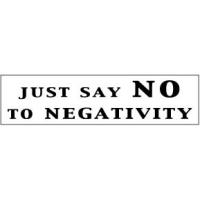I have learned through my career that being negative can be a very powerful social tool.
For example, if you taste a freshly opened bottle of wine and declare it ‘decidedly average’ to the surrounding company, what will they think? People who dislike the wine will like you as you clearly share their discerning taste, whereas those that like it will imagine that you must drink some rather marvellous wines at home. It would only be a very small minority of experts who may actually determine if your judgement is a fair assessment, and even then, wine experts have admitted openly to me that it is largely a matter of personal taste anyway once you get to a certain minimum level of quality.
On the other hand, being positive about the wine is more risky. People who like it will be fine, but those that don’t will assume you to be either incompetent or at best, to have strange taste.
Thus you can see, that if your choice of commentary is to be “done by the numbers” then being a little negative is a good strategy.
Of course, wine is fairly trivial, but this concept goes much further. Imagine, if you will, a panel discussing a job applicant.
 Imagine yourself on an esteemed panel, and your job is to discuss the most recent hopeful. Eyes turn to you. If you say you though the applicant was superb, and they agree, all is well – however, if they felt the person’s claim at competence was a flagrant lie, they would be inclined to review their opinion of you. If, on the other hand you are generally dismissive, the others may be led to think you know something they don’t.
Imagine yourself on an esteemed panel, and your job is to discuss the most recent hopeful. Eyes turn to you. If you say you though the applicant was superb, and they agree, all is well – however, if they felt the person’s claim at competence was a flagrant lie, they would be inclined to review their opinion of you. If, on the other hand you are generally dismissive, the others may be led to think you know something they don’t.
This phenomena, while not often discussed, has been commonly found to be highly developed, but , I would suggest, more often by accident than design. In other words, some people, who are wont to be negative and dismissive may rise to positions of respect and influence for no good reason other than people’s assumptions about them. These individuals have no alternative to assuming that they are indeed wise and discerning, since they are so routinely deferred to.
There are most assuredly also people who use the method deliberately, but I have yet to see the skill claimed when I have discussed it openly.
—
 After deciding to rant a little on the subject on this blog, I thought it may be just the thing to actually do a little research. It did not take long to see similar effects being used in other walks of life. It turns out marketeers and advertisers have long known about the power of negativity – the theory that the fear of loss is stronger in us than our ambition for gain, is borne out in our tendency to allow negative product reviews more to sway us further than equally positive ones. Thus the strong desire by advertisers (or politicians) to denigrate the opposition rather than to spend time actually developing some genuine merit.
After deciding to rant a little on the subject on this blog, I thought it may be just the thing to actually do a little research. It did not take long to see similar effects being used in other walks of life. It turns out marketeers and advertisers have long known about the power of negativity – the theory that the fear of loss is stronger in us than our ambition for gain, is borne out in our tendency to allow negative product reviews more to sway us further than equally positive ones. Thus the strong desire by advertisers (or politicians) to denigrate the opposition rather than to spend time actually developing some genuine merit.
—
The Take Away
So what can be done about it? Well clearly it is well worth taking a moment to reflect the next time we hear someone being negative about something. I also suggest a much more interesting course of action. Next time you are chatting idly to a colleague to whom you may have in the past turned to for advice or critique – and ask yourself: are they one of these nasty negative nancies? Unless they are positive at least half the time, I posit they are, and you should smile inwardly and take them down a notch or two.